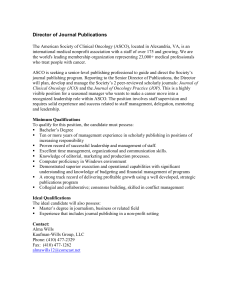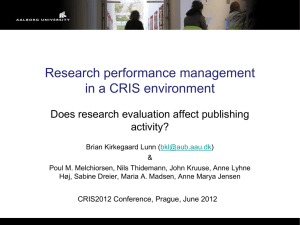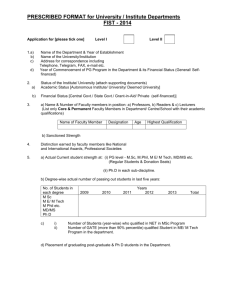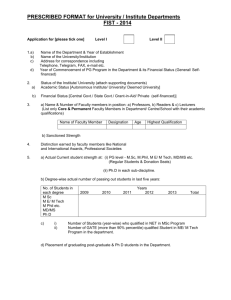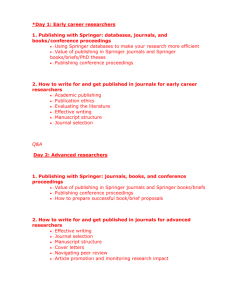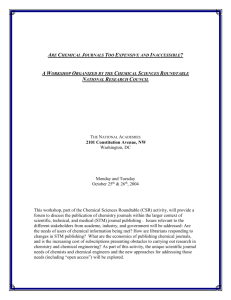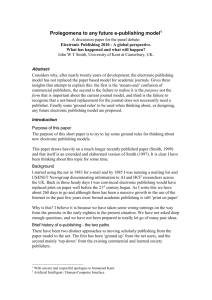Standard Operating Procedure for Open Access Journals
advertisement
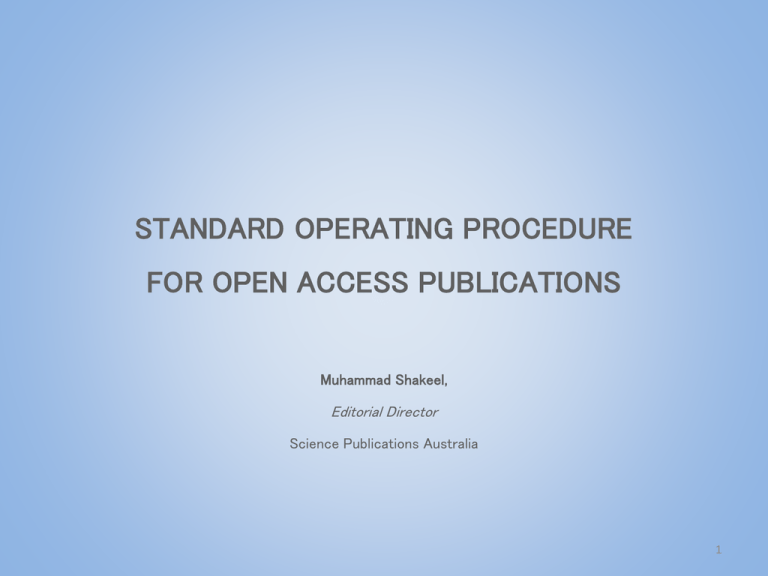
STANDARD OPERATING PROCEDURE FOR OPEN ACCESS PUBLICATIONS Muhammad Shakeel, Editorial Director Science Publications Australia 1 TYPES OF PUBLISHING CONCEPTS SUBSCRIPTION-BASED PUBLISHING OPEN ACCESS PUBLISHING 2 3 - We have seen the introduction, success and demise of many technologies and business strategies - One main example being Kodak’s highly popular and successful film cameras - It failed after the introduction of digital cameras - We have a similar situation with Subscription-Based publishing - Open Access is on the verge of replacing the traditional publishing model 4 INTERNATIONAL LEGISLATIVE SUPPORT Australia Canada 5 INTERNATIONAL LEGISLATIVE SUPPORT United States United Kingdom 6 INTERNATIONAL LEGISLATIVE SUPPORT European Funding Agencies Universities Libraries 7 ADVANTAGES OF OPEN ACCESS Free Access to Research Greater Visibility 8 DISADVANTAGES OF OPEN ACCESS Article Processing Charges Lack of Quality 9 UNETHICAL OPEN ACCESS PUBLISHING - Has become very easy for people with spare time and a few computer skills to launch their own publication - This is damaging the open access concept - Two incidents presented today are: - SciencePublication.org a publisher of two open access journals - Journal of Coastal Life Medicine 10 Original Publisher Website Hoax Publisher Website Domain:thescipub.com Domain:sciencepublication.org - Uses our publisher’s name in its efforts to cash our brand name - Serious case of Identify Theft in both South Australia and in the United States 11 JOURNAL OF COASTAL LIFE MEDICINE Uses Elsevier’s logo on its website without approval 12 OPEN ACCESS STATISTICS As of February 2013 As of August 2014, Electronic Journals Library (EZB) DOAJ reported the inclusion of 9,947 journals reports 38,483 e-journals ALARMING CONSIDERING THAT MOST PUBLICATIONS ARE NOT FOLLOWING ANY GUIDELINES 13 STANDARD OPERATING PROCEDURE - Standardization is defined as the process of developing and implementing technical standards. - It is necessary to develop a model that can be used by all open access publications 14 PROPOSED METHOD 15 IMPLEMENTATION OF PROPOSED MODEL IN SCIENCE PUBLICATIONS: A CASE STUDY - We have implemented this model for one of our journals - This model is highly effective and very efficient - Only concern is the availability of reviewers - Some of them are busy with their academic duties 16 CONCLUSION - Open Access Publishing is a viable publishing concept - Publications need to follow some guidelines (SOP) to ensure the quality of the Open Access model 17 FUTURE DIRECTIONS The ACSE should establish committees to work on the following suggestions: 1. Recommend a standard operating procedure for scholarly journals. 2. Offer courses to authors, reviewers and editors regarding different aspects of the publication process. 3. Design and Offer extensive courses regarding the ethical issues that can arise during the publishing process. If possible the committee should collaborate with COPE to arrange seminars with experts in the field of publication ethics. 4. If any member is found to be involved in unethical practice, some fines should be applied or the party at fault should be enforced to attend some specially designed course for the such incident. Penalty may be deposited to the account of ACSE. 18 ACKNOWLEDGEMENT I would like to acknowledge the support of the following organizations for their generous assistance: Science Publications Australia The Asian Council of Science Editors (ACSE) 19

